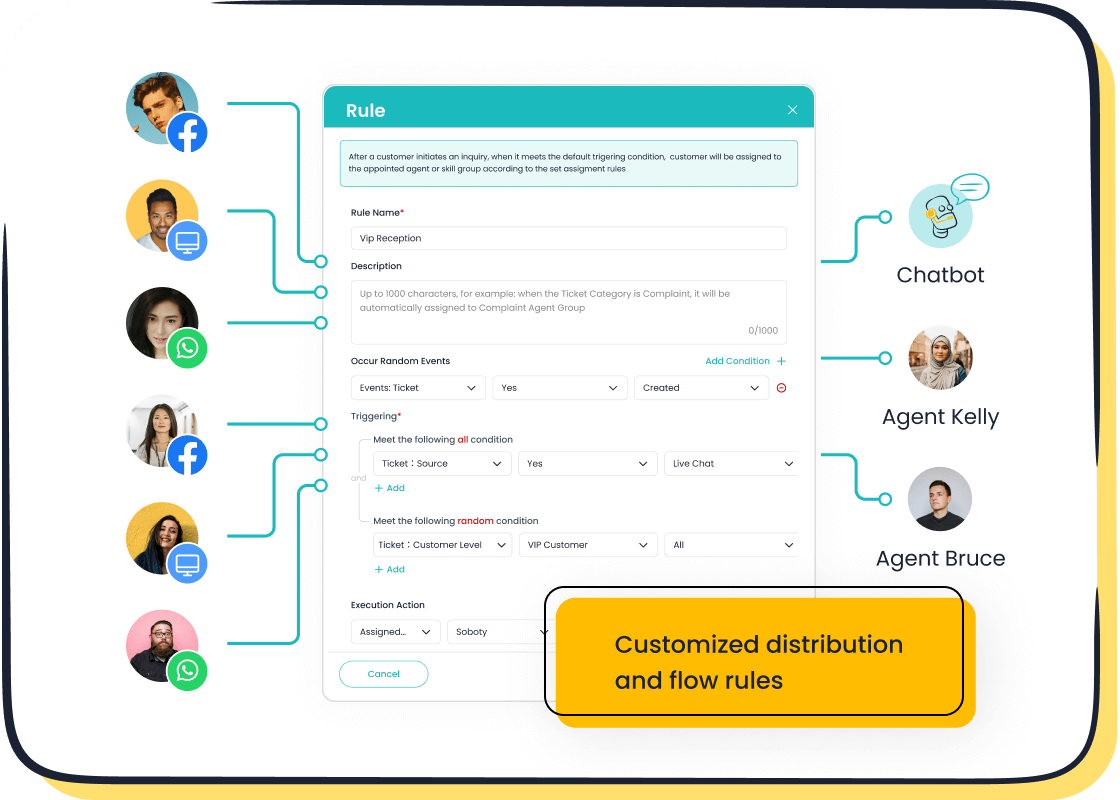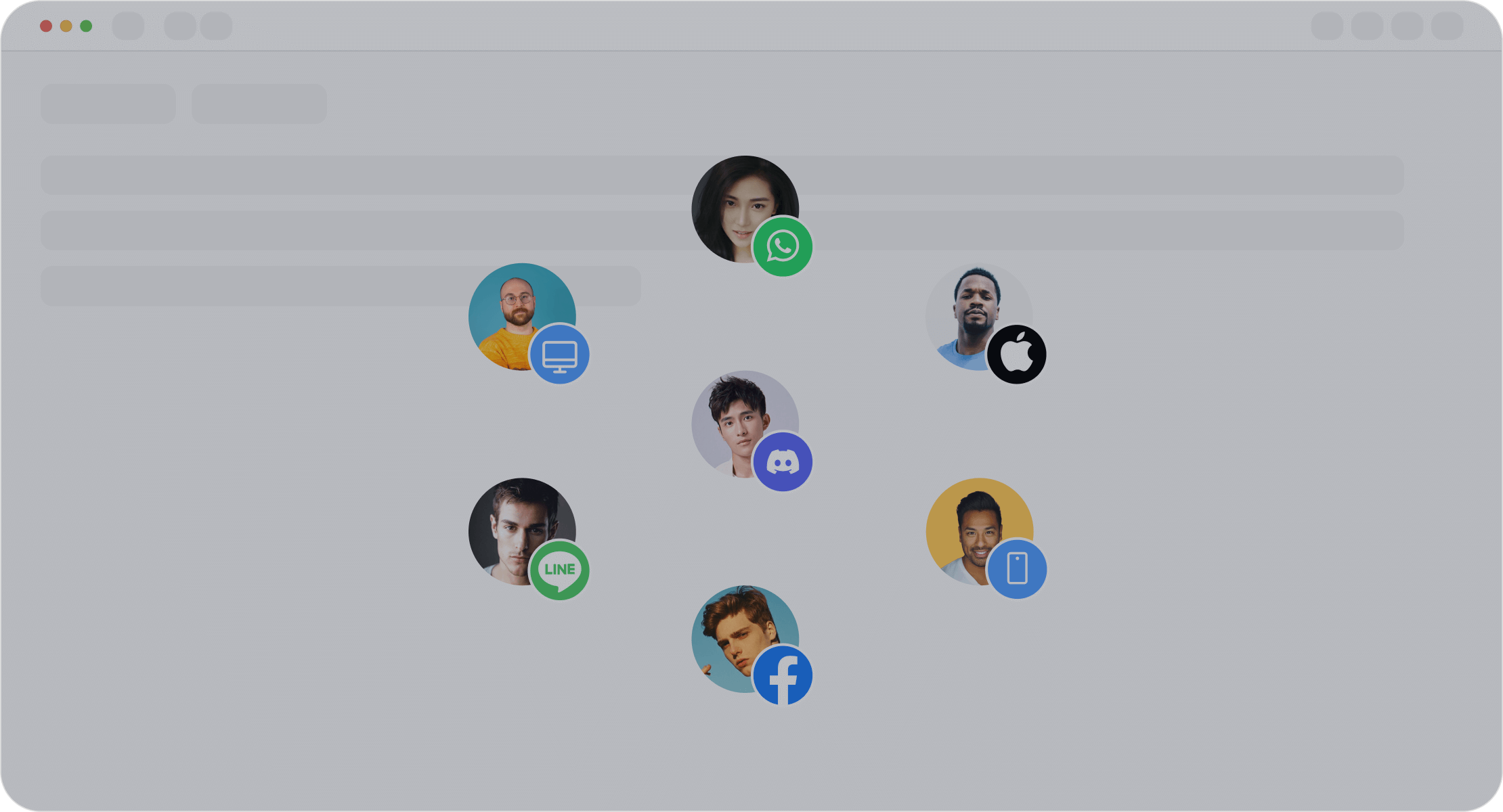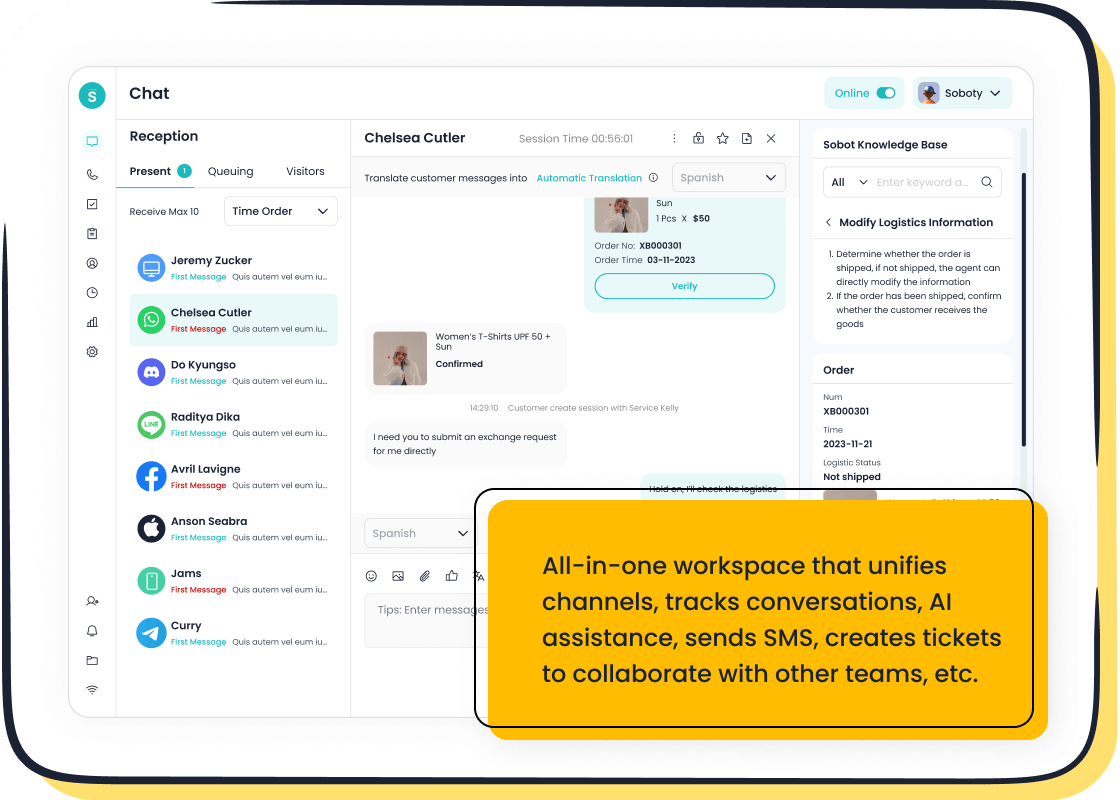Key Innovations in Digital Customer Communication for 2025

Digital customer communication in 2025 will center on AI-powered personalization, seamless omnichannel engagement, and real-time analytics. Companies see a sharp rise in customer experience expectations, with 82% of executives planning to integrate AI and 61% of consumers willing to pay more for personalized service. Sobot leads this shift through advanced omnichannel and AI-driven solutions, such as Sobot AI and Sobot call center. Businesses must now assess their digital customer experience strategies to keep pace with these service trends for 2025 and ensure lasting customer loyalty.
AI and Personalization

Artificial intelligence is reshaping customer communication technology in 2025. Companies now use advanced AI to deliver personalized customer experiences that drive loyalty and satisfaction. Sobot’s AI solutions lead this digital transformation by combining generative AI, hyper-personalization, and emotion analytics to meet rising customer expectations.
Generative AI
Generative AI powers a new wave of customer experience by enabling multimodal support across text, voice, and media. Businesses use voice-based AI assistants for natural conversations and multilingual translation to serve global customers. Sobot’s AI platform provides real-time insights to agents, helping them deliver faster and more accurate support. Companies also use predictive analytics to anticipate customer needs and offer proactive service. Generative AI ensures ethical standards through transparency and human oversight, maintaining trust in every interaction.
- Multimodal support: text, voice, and media
- Real-time agent insights
- Multilingual translation for global reach
- Predictive analytics for proactive support
- Human-in-the-loop for ethical AI
Hyper-Personalization
Hyper-personalization stands out as a top trend in communication tech trends for 2025. AI-driven personalization uses machine learning, predictive analytics, and data integration from websites, apps, and social media to create unique experiences for each customer. Sobot’s AI-driven personalization tools analyze customer data to recommend products, tailor messages, and automate workflows. This approach leads to measurable results:
| Measurable Outcome | Statistic / Result |
|---|---|
| Companies reporting measurable results | 86% see business improvements |
| Consumer appeal of personalized marketing | 90% find it appealing |
| Repeat purchase likelihood | 40% more likely after personalized service |
| Profit increase prediction | Up to 25% profit increase (Gartner) |
Personalization through AI helps companies boost engagement, conversion rates, and customer loyalty.
Emotion Analytics
Emotion analytics takes customer experience to a deeper level. By analyzing facial expressions, voice tones, and text, brands understand how customers feel during interactions. Sobot’s AI uses emotion analytics to personalize responses, making customers feel valued and understood. This technology helps companies create campaigns that connect emotionally, leading to higher satisfaction and repeat business. Emotion analytics, combined with satisfaction surveys, gives a full view of the customer journey and supports stronger, more personalized customer experiences.
Companies that use emotion analytics report higher customer satisfaction, loyalty, and increased spending.
Omnichannel Digital Customer Communication

Omnichannel strategies have become essential in digital customer communication. Businesses now recognize that customers expect seamless digital experiences across every channel. Omnichannel communication connects email, chat, social media, and voice, allowing customers to switch platforms without losing conversation history. This approach builds seamless customer relationships and ensures a consistent brand message.
Seamless Integration
Seamless integration stands at the core of modern customer communication technology. Companies that integrate all digital channels deliver responsive and personalized service. Customers can move from a website chat to a social media message without repeating information. This integration supports unified brand communication and builds trust. Data-driven insights from integrated channels help businesses predict trends and tailor marketing strategies. Agents gain access to comprehensive customer data, which improves their ability to resolve complex inquiries. According to recent research, companies using omnichannel strategies see an 89% improvement in customer retention and a 33% increase in customer satisfaction. These results show that seamless integration drives better customer experience and loyalty.
Unified Workspaces
Unified workspaces transform digital customer experience by bringing all tools, data, and workflows into one intelligent platform. Agents no longer need to switch between tabs or systems. They can manage tickets, track leads, and collaborate in real time. Centralized customer data allows for context-rich, personalized experiences. AI-powered guidance and automation reduce response times and improve accuracy. Open APIs and no-code customization enable businesses to adapt workflows quickly. Unified workspaces empower teams, simplify processes, and elevate customer engagement.
Sobot Live Chat

Sobot Live Chat leads the way in omnichannel unification. The platform supports websites, apps, and social media channels like WhatsApp, Facebook, and Instagram. Sobot Live Chat offers a unified workspace, AI-assisted tools, and built-in analytics. Agents can view all customer interactions in one place, ensuring no missed messages and faster response times. The system’s seamless integration and rich messaging options help businesses deliver consistent, high-quality customer experience. Sobot Live Chat’s precise profiling and tailored services have increased conversion rates by 38%, showing the impact of advanced omnichannel solutions on digital customer communication trends. For more details, visit Sobot Live Chat.
Omnichannel strategies will remain a core trend in 2025, shaping the future of digital customer experience and engagement.
Automation and Agentic AI
Automation and agentic AI have transformed customer service in 2025. Companies now use advanced customer communication technology to automate routine tasks and deliver faster, more accurate support. Sobot’s chatbot and ticketing system stand at the forefront of this shift, helping businesses improve customer experience and operational efficiency.
Chatbots and Virtual Agents
Chatbots and virtual agents play a key role in modern customer service. They provide instant answers, reduce response times, and handle a high volume of customer inquiries. AI agents can cut average response times from 11 minutes to just 2 minutes. This speed leads to higher customer satisfaction. Virtual agents go beyond basic chatbots by using context awareness and continuous learning. They resolve complex requests and deliver personalized service. Companies using AI agents report solving up to 86% of customer questions. The table below shows how these tools impact customer experience:
| Metric | Description | Impact on Customer Experience |
|---|---|---|
| Response Time | Speed of replies to customer queries | Faster replies increase satisfaction |
| Customer Satisfaction | Scores from post-interaction surveys | Higher scores reflect better experiences |
| Resolution Rate | Percentage of queries resolved | More resolutions mean happier customers |
Human-AI Collaboration
A balance between automation and human touch remains essential for optimal customer experience. Companies identify key touchpoints where automation improves efficiency but keep humans involved for complex issues. Segmenting audiences and using data insights help tailor customer interactions. Automated surveys gather feedback, allowing businesses to adapt and improve. Brands that blend automation with human support see up to 80% higher engagement rates. Empathy and authentic connection still matter, especially for complex customer service needs.
Sobot in Action
Sobot’s solutions show the real impact of automation and agentic AI. OPPO, a global smart device leader, used Sobot’s chatbot and ticketing system to manage high volumes of customer service requests. The results were impressive:
| Metric | Result Achieved by OPPO with Sobot's Solution |
|---|---|
| Chatbot Resolution Rate | 83% |
| Positive Feedback Score | 94% |
| Increase in Repeat Purchases | 57% |
OPPO improved customer experience, increased satisfaction, and boosted loyalty. Sobot’s platform enabled OPPO to deliver efficient, personalized service while freeing agents to focus on complex customer issues. This case highlights how automation and agentic AI drive measurable gains in customer service and business outcomes.
Real-Time Feedback and Analytics
Real-time feedback and analytics have become essential for companies aiming to deliver outstanding customer experience. Businesses now rely on instant feedback loops to understand how customers feel and what they need at every touchpoint. This approach helps brands respond quickly, build trust, and improve satisfaction.
Instant Feedback Loops
Instant feedback loops allow companies to capture customer opinions right after an interaction. Methods include chat surveys after support tickets, in-app surveys, and website pop-ups at key moments. Timing surveys around important actions, such as after a purchase or feature use, increases relevance and response rates. Most consumers prefer giving feedback within mobile apps, making it crucial for brands to offer easy, short surveys. Sobot’s built-in satisfaction surveys and post-chat feedback tools help businesses gather real-time customer feedback across channels. The table below shows how real-time feedback impacts customer retention and satisfaction:
| Evidence Aspect | Description |
|---|---|
| Customer Retention Increase | Companies using real-time feedback are 33% more likely to retain customers. |
| Satisfaction Rating Improvement | Sentiment analysis of feedback led to a 25% increase in customer satisfaction. |
| In-App Feedback Preference | 72% of customers prefer giving feedback within mobile apps. |
| Post-Chat Survey Impact | A telecom company saw a 20% increase in satisfaction after implementing post-chat surveys. |
| Review Influence on Spending | Customers spend 31% more on businesses with excellent reviews. |
Data-Driven Insights
Data-driven insights turn feedback into action. Sobot’s analytics dashboard consolidates feedback from all channels, providing a clear view of customer experience trends. AI-powered tools group feedback by topic and sentiment, making it easy to spot patterns. Dashboards visualize survey results, helping teams track satisfaction scores and identify areas for improvement. Integrations with other platforms allow businesses to automate follow-ups and ensure feedback leads to real changes. Analytics unify data from chat, email, and social media, supporting seamless omnichannel experiences.
Enhancing Customer Experience
Enhanced analytics help companies personalize service and anticipate customer needs. For example, e-commerce brands use data to optimize checkout flows, while financial services personalize advice based on behavior. Customer journey mapping through analytics highlights pain points and opportunities, leading to better experiences and higher loyalty. Sobot’s real-time analytics and satisfaction surveys give businesses the tools to measure, monitor, and improve every customer interaction. Companies that invest in analytics see measurable gains in customer experience, satisfaction, and retention.
Privacy, Trust, and Ethical Trends
Digital customer communication in 2025 places privacy, trust, and ethics at the center of every customer service interaction. As regulations and consumer expectations evolve, companies must adapt their strategies to protect customer data and build lasting relationships.
Data Privacy
Data privacy has become a top priority for every business. Regulations such as the EU’s GDPR require companies to obtain explicit consent, notify authorities of breaches within 72 hours, and provide customers with rights to access, correct, or erase their data. The Digital Services Act and Digital Markets Act add new layers of transparency and accountability, especially for large platforms. In the United States, sector-specific laws like HIPAA and COPPA, along with state-level rules, create a complex landscape. Best practices for 2025 include clear privacy policies, robust consent management, and transparent data use. Sobot’s solutions support these requirements with GDPR-compliant features, data encryption, and secure backups, helping businesses stay ahead of service trends for 2025.
- Maintain clear privacy policies
- Use strong consent management tools
- Prepare for quick breach response
- Ensure transparency in all data use
Trust Building
Trust forms the foundation of excellent customer experience. Companies that communicate openly about data collection and protection earn loyalty. In fact, 94% of consumers say they remain loyal to brands that practice transparency. Sobot builds trust by offering secure, transparent customer service solutions and clear communication about data handling. The table below highlights key aspects of transparency:
| Aspect of Transparency | Impact on Customer Experience | Example |
|---|---|---|
| Data Transparency & Privacy | Enhances loyalty and trust | Spotify’s privacy controls |
| Business-wide Openness | Reduces distrust, encourages repeat purchases | |
| Social Responsibility | Builds authenticity and brand loyalty | Patagonia, Starbucks |
| Data Security | Maintains trust, protects reputation |
Open communication and ethical practices help companies foster long-term customer relationships.
Ethical Digital Communication
Ethical digital communication means more than following laws. Companies must act with honesty, respect cultural differences, and protect customer privacy. They should avoid false promises and acknowledge mistakes openly. Ethical marketing respects customer rights and avoids stereotypes. Sobot’s customer service tools help businesses communicate clearly and fairly, supporting unbiased and respectful interactions. By embedding ethical guidelines into every customer service process, companies strengthen their credibility and improve the overall customer experience.
Companies that prioritize privacy, trust, and ethics see stronger customer loyalty and better business outcomes.
Multimedia and Interactive Engagement
Digital engagement strategies in 2025 rely on multimedia and interactive experiences to capture attention and build lasting connections. Brands use short-form video, rich messaging, and augmented reality (AR) to create memorable customer experiences and drive engagement across every touchpoint.
Short-Form Video
Short-form video has become a powerful tool for brands. These videos quickly capture attention and encourage interaction through likes, comments, and shares. Marketers report that 81% see direct sales increases from video content. Videos under 90 seconds keep a 50% retention rate, making messages easy to absorb. Authentic short-form videos are 52% more likely to be shared, expanding reach and engagement. Calls-to-action in videos prompt viewers to book, buy, or learn more, which boosts conversion rates. The table below highlights the impact of short-form video:
| Impact Aspect | Explanation |
|---|---|
| Brand Engagement | Quick attention, more interaction, higher retention |
| Customer Retention | Short, captivating videos keep users engaged longer |
| Conversion Rates | Calls-to-action drive bookings and purchases |
| Discoverability | Platform algorithms favor short videos, increasing reach |
| Strategy | Trends and user content improve engagement and conversion |
Rich Messaging
Rich messaging transforms digital customer communication by adding images, videos, GIFs, and interactive buttons to messages. Unlike basic SMS, rich messaging supports high-quality media, read receipts, typing indicators, and group chats. Sobot Live Chat enables businesses to use rich messaging across websites, apps, and social media. Agents can send carousels, quick replies, and multimedia content, making every customer interaction more engaging and personal. These features help brands deliver vibrant, interactive experiences that increase satisfaction and build loyalty.
AR Experiences
AR experiences let customers interact with products in new ways. Automotive brands like Toyota offer virtual test drives, while beauty companies such as Christian Dior Parfums provide virtual try-ons. Retailers use AR mirrors for product demos, and entertainment brands create AR games to boost engagement. These applications increase interaction, drive social sharing, and make the customer experience more memorable. Sobot’s omnichannel platform supports integration with AR campaigns, helping brands deliver immersive digital engagement that stands out in a crowded market.
Interactive storytelling, social sharing, and gamification all contribute to higher customer satisfaction and loyalty. Brands that invest in multimedia and interactive engagement see stronger relationships and better business outcomes.
Digital customer communication in 2025 will rely on AI, omnichannel integration, automation, and privacy-first strategies. Companies see success by curating quality data, automating workflows, and using real-time analytics to improve digital customer experience. Experts recommend instant AI-driven responses, context-first channel selection, and verified messaging to build trust. Sobot’s Live Chat and AI solutions help businesses future-proof engagement.
| Action Step | Impact |
|---|---|
| Evaluate current strategies | Identify gaps and opportunities |
| Upgrade with Sobot solutions | Boost satisfaction and operational success |
Now is the time to review and upgrade your digital customer communication approach for long-term growth.
FAQ
What is digital customer communication, and why does it matter in 2025?
Digital customer communication uses technology to connect businesses and customers through channels like chat, email, and social media. In 2025, companies must use AI and automation to meet rising customer experience expectations and deliver fast, personalized service.
How does Sobot improve customer experience with AI and automation?
Sobot uses AI-powered chatbots and automation tools to answer questions instantly, reduce wait times, and personalize support. For example, OPPO achieved an 83% chatbot resolution rate and a 94% positive feedback score after using Sobot’s digital customer communication solutions.
Why is omnichannel support important for digital customer communication?
Omnichannel support lets customers switch between channels—like WhatsApp, websites, and apps—without losing conversation history. Sobot’s Live Chat unifies all messages in one workspace, improving customer experience and ensuring no missed interactions.
How does real-time analytics help businesses enhance digital customer communication?
Real-time analytics track customer feedback and agent performance. Sobot’s built-in analytics dashboard helps companies spot trends, improve service, and make data-driven decisions. Businesses using analytics see up to a 33% increase in customer retention.
What steps can companies take to future-proof their digital customer communication strategy?
Companies should adopt AI, automation, and omnichannel platforms like Sobot. They need to focus on privacy, use real-time analytics, and train teams for new technologies. These steps help deliver better customer experience and stay ahead in 2025.
Tip: Explore Sobot’s solutions to upgrade your digital customer communication and boost customer experience.
See Also
Discover The Leading Cloud Contact Centers For 2025
Best Ten Customer Voice Software Solutions In 2024
Ten Essential Steps To Deploy Omnichannel Contact Centers
